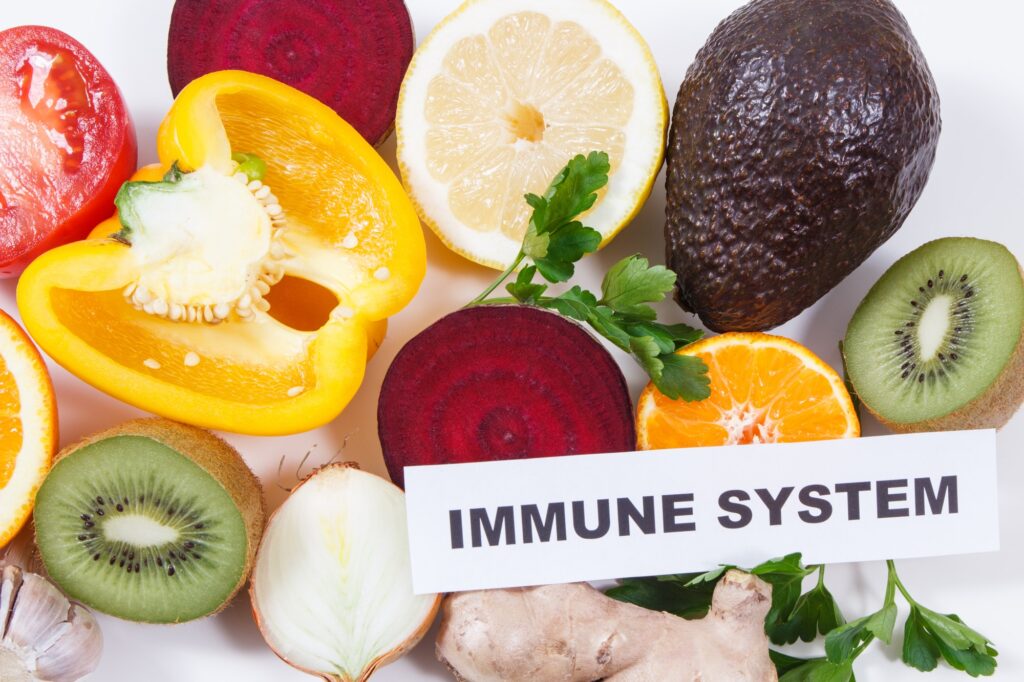
Boosting your immune system is vital to maintaining good health and well-being. In this blog, Health and Wellness Coach Jacqueline Ford, explores various strategies to strengthen your immune system and explains why it’s so important.
Understanding the Immune System

Before diving into ways to boost your immune system, it’s crucial to understand what it is and how it functions. The immune system is a complex network of cells, tissues, and organs that work together to defend your body against invaders like bacteria, viruses, and other pathogens. A strong immune system is your first line of defense against illnesses and infections. Boosting the immune system is really important for cancer patients or other patients who have weak immune systems.
Why a Strong Immune System is Important

A robust immune system is essential for several reasons:
Disease Prevention
A well-functioning immune system helps prevent infections and diseases, including the common cold, flu, and more severe conditions.
Faster Recovery
If you get sick, a strong immune system can help you recover more quickly.
Overall Health
Your immune system is interconnected with other bodily systems, so keeping it strong contributes to overall health and vitality.
Natural Ways to Boost Your Immune System

Maintain a Healthy Diet
Eating a balanced diet rich in fruits, vegetables, whole grains, lean proteins, and healthy fats is crucial. These foods provide essential nutrients like vitamins C and E, beta-carotene, and zinc, which are vital for immune function.
Citrus fruits like oranges, lemons, and grapefruits are high in vitamin C, a known immune booster.
Leafy green vegetables such as spinach and kale are rich in vitamins and antioxidants.
Garlic has immune-boosting properties due to its sulfur-containing compounds.
Regular Physical Activity

Exercise contributes to overall good health and a healthy immune system. Regular, moderate exercise can improve the efficiency of your immune system.
Adequate Sleep

Sleep has a direct impact on immune function. Lack of sleep can impair the body’s ability to fight infections. Adults should aim for 7-8 hours of quality sleep each night. Establish a regular sleep schedule and create a restful environment to enhance sleep quality.
Stress Management

Chronic stress can weaken the immune system. Managing stress is critical to maintaining a healthy immune response. Techniques like meditation, deep breathing exercises, and yoga can help reduce stress levels.
Hydration

Staying hydrated is essential for overall health and helps the immune system function optimally. Drink plenty of water throughout the day.
Limit Alcohol and Avoid Smoking

Excessive alcohol consumption and smoking can weaken the immune system and make you more susceptible to infections. If you drink alcohol, do so in moderation. Avoid smoking and exposure to secondhand smoke.
Maintain a Healthy Weight

Being overweight or underweight can affect immune function. Maintaining a healthy weight is crucial for immune health. Follow a balanced diet and regular exercise program to achieve and maintain a healthy weight.
Probiotics and Prebiotics

Gut health is closely linked to immune function. Probiotics (good bacteria) and prebiotics (food for good bacteria) can help maintain a healthy gut microbiome. Include fermented foods like yogurt, kefir, and sauerkraut in your diet. Foods high in fiber also promote gut health.
Boosting your immune system naturally involves a combination of healthy lifestyle choices. You can strengthen your body’s natural defenses by focusing on a balanced diet, regular exercise, adequate sleep, stress management, and other healthy habits. Remember, a robust immune system is not just about preventing illness; it’s about maintaining overall health and well-being.
Practice Good Hygiene
Good hygiene practices are a critical foundation for preventing infections and strengthening your immune system.
Regular Handwashing

Frequent and thorough handwashing with soap and water is one of the most effective ways to prevent the spread of infections.
Oral Hygiene

Maintaining good oral health, including regular brushing and flossing, can also impact overall health and immune function.
Food Safety
Proper handling, preparation, and storage of food reduce the risk of foodborne illnesses, which can tax your immune system.
Avoid Touching Your Face
Minimizing hand-to-face contact reduces the risk of transferring viruses and bacteria from surfaces to your mouth, nose, or eyes.
Incorporating these hygiene practices into your daily routine prevents the spread of diseases. It also supports your immune system’s ability to combat pathogens more effectively.
If you need guidance to develop a plan to improve your immune system, contact Jacqueline.

